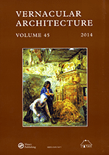
Vernacular Architecture
Scope & Guideline
Investigating the Roots of Architectural Identity
Introduction
Aims and Scopes
- Documentation of Vernacular Building Types:
The journal emphasizes the importance of cataloging various types of vernacular buildings, including timber-framed structures and traditional houses, to preserve architectural heritage and inform future conservation efforts. - Historical and Archaeological Analysis:
Research often involves historical context and archaeological findings to explore how vernacular architecture has evolved over time, providing insights into the social, economic, and environmental factors influencing building practices. - Cultural Heritage and Identity:
A consistent focus is placed on how vernacular architecture contributes to cultural identity and heritage, examining the narratives associated with traditional structures and their significance to local communities. - Interdisciplinary Approaches:
The journal employs a range of methodologies, including dendrochronology, historical research, and architectural analysis, to explore the multifaceted aspects of vernacular architecture. - Regional Studies:
The journal showcases studies from various geographical regions, demonstrating the diversity of vernacular architecture and its adaptation to different environmental and cultural contexts.
Trending and Emerging
- Sustainability and Eco-friendly Building Practices:
Recent publications increasingly focus on sustainable building materials and techniques used in traditional architecture, addressing contemporary issues of environmental conservation and climate change. - Digital Heritage and Archiving:
The use of digital tools for documenting and analyzing vernacular architecture is gaining traction, reflecting an emerging interest in how technology can enhance preservation efforts and accessibility. - Community Engagement in Preservation Efforts:
There is a rising trend towards involving local communities in the documentation and preservation of their architectural heritage, emphasizing participatory approaches and local knowledge. - Cross-Cultural Comparisons:
Emerging studies are beginning to draw comparisons between vernacular architectures in different cultural contexts, highlighting global influences and shared practices that transcend local boundaries. - Gender Perspectives in Vernacular Studies:
Increasingly, research is exploring the role of gender in vernacular architecture, focusing on how women’s contributions and experiences are represented in the built environment.
Declining or Waning
- Urban Vernacular Architecture:
While urban vernacular architecture was once a prominent theme, recent issues have shifted focus more towards rural and traditional buildings, possibly due to a growing interest in rural heritage preservation. - Modern Adaptations of Vernacular Styles:
The exploration of contemporary interpretations and adaptations of vernacular styles has decreased, indicating a possible preference for historical perspectives rather than modern adaptations. - Influence of Industrialization on Vernacular Practices:
There has been less emphasis on examining the impact of industrialization on traditional building practices, which may suggest a move towards more localized studies rather than broader socio-economic influences.
Similar Journals
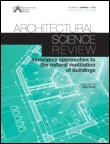
Architectural Science Review
Innovating the built environment through rigorous research.Architectural Science Review, published by Taylor & Francis Ltd, is a leading academic journal dedicated to the interdisciplinary study and exploration of architectural science and its implications on the built environment. With a rich history dating back to 1958 and an impressive convergence of research culminating in 2024, this journal has firmly established itself within the Q1 quartile of architecture, reflecting its significant influence and high impact, evidenced by its ranking at #20 out of 189 in the engineering architecture category on Scopus, placing it in the 89th percentile. The journal aims to contribute to the advancement of architectural knowledge by publishing rigorous research, innovative methodologies, and insightful discussions that resonate with architects, engineers, educators, and students alike. Although it does not currently offer open access options, the content within offers invaluable resources for those navigating the complexities of architectural discourse. The Architectural Science Review remains an essential platform for disseminating critical findings and fostering scholarly dialogue in an ever-evolving field.

Architecture and Culture
Advancing Interdisciplinary Insights in Built EnvironmentsArchitecture and Culture is an esteemed journal published by Routledge Journals, Taylor & Francis Ltd, focusing on the intersection of architecture, cultural studies, urbanism, and the visual and performing arts. Since its inception, this journal has become a vital platform for researchers, professionals, and students to explore the multifaceted relationship between architecture and cultural identity within contemporary contexts. With an ISSN of 2050-7828 and an E-ISSN of 2050-7836, the journal reaches a global audience from its base in the United Kingdom. Featuring a commendable Q2 ranking in Visual Arts and Performing Arts and a consistent presence in multiple relevant quartiles, including Q3 in both Architecture and Cultural Studies, it is well-regarded for its scholarly impact. The journal offers a unique opportunity for interdisciplinary dialogue, fostering innovative research that examines how built environments shape and are shaped by cultural narratives. This commitment to advancing knowledge in these fields is reflected in its ongoing publication from 2014 to 2024, making it a pivotal resource for those at the forefront of the discourse on architecture and culture.
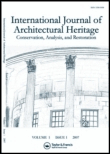
International Journal of Architectural Heritage
Championing the Art of Conservation and Architecture.The International Journal of Architectural Heritage is a premier publication dedicated to the multidisciplinary fields of architecture, conservation, and visual arts. Published by TAYLOR & FRANCIS INC, this journal serves as a vital platform for scholars and practitioners who aim to advance knowledge in the preservation of cultural heritage and architectural innovation. With an impressive impact factor reflecting its critical acclaim, including rankings in the top quartile (Q1) across multiple categories in 2023, the journal is recognized as a key resource in Arts and Humanities, particularly in Visual Arts and Performing Arts and Conservation. Since its inception in 2007, the journal has consistently provided rigorous peer-reviewed research, offering enriching insights and fostering collaborations amongst students, researchers, and professionals committed to the future of architectural heritage. As it continues to influence the field through its diverse and impactful contributions, readers can expect to engage with leading-edge studies that not only illuminate current trends but also inspire innovative practices in safeguarding architectural legacies.
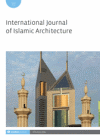
International Journal of Islamic Architecture
Celebrating the Rich Tapestry of Islamic Architectural HeritageThe International Journal of Islamic Architecture, published by INTELLECT LTD in the United Kingdom, is a pivotal scholarly resource dedicated to the exploration of Islamic architecture, design, and cultural expressions within a contemporary framework. With ISSN 2045-5895 and E-ISSN 2045-5909, this journal targets an interdisciplinary audience by bridging the gap between architecture, geography, urban studies, and the arts. Established in 2012, it has swiftly garnered recognition, achieving notable rankings such as Q3 in Architecture and Q2 in Visual Arts and Performing Arts by 2023. Although it currently does not offer open access, its articles are meticulously peer-reviewed, ensuring high academic standards and relevance. Emphasizing the significance of Islamic architectural heritage in global contexts, the journal seeks to foster innovative perspectives and critical discourse, making it an essential platform for researchers, professionals, and students alike to engage with contemporary architectural practices and cultural dialogues.

Open House International
Exploring the Future of Urban Design and ArchitectureOpen House International is a distinguished peer-reviewed journal that serves as a vital resource in the fields of Architecture, Urban Studies, and Geography, Planning and Development. Published by Emerald Group Publishing Ltd, the journal circulates valuable insights and research findings that address contemporary challenges and innovations within urban environments. With an impressive 2023 Scopus ranking that places it in the Q2 category in Architecture and Q3 in Geography, Planning and Development, the journal is recognized for contributing significantly to scholarly discourse. Although it follows a traditional access model, the journal's commitment to curating high-quality content remains paramount. As it transitions into a new decade of publishing, from 2007 to 2024, Open House International continues to attract submissions that push the boundaries of knowledge in urban and architectural studies, engaging researchers, professionals, and students alike in the vibrant dialogue on the built environment.
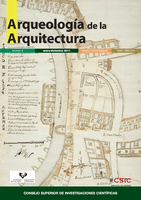
Arqueologia de la Arquitectura
Innovative Insights into Architectural ConservationArqueologia de la Arquitectura is a premier scholarly journal published by CONSEJO SUPERIOR INVESTIGACIONES CIENTIFICAS-CSIC, specializing in the intricate intersections of architecture, archaeology, and conservation. Since its inception in 2002, this Open Access journal has provided researchers, professionals, and students with a platform to share innovative findings that deepen our understanding of architectural heritage and its archaeological contexts. Based in Spain, it has demonstrated remarkable academic rigor and impact, achieving Q1 rankings in multiple categories, including Architecture and Visual Arts and Performing Arts, alongside a Q2 in Archaeology as of 2023. With a robust presence in Scopus, ranking within the 88th percentile for Visual Arts and Performing Arts, Arqueologia de la Arquitectura stands as a crucial resource for those dedicated to the preservation and study of our built heritage, encouraging interdisciplinary dialogue and research advancements in these elegant fields of study.
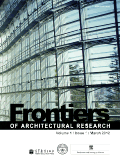
Frontiers of Architectural Research
Fostering Interdisciplinary Dialogue in Architectural ResearchFrontiers of Architectural Research, published by KEAI PUBLISHING LTD, stands at the forefront of interdisciplinary scholarship, addressing contemporary challenges in the fields of architecture, urban studies, building and construction, and archaeology. Since its establishment in 2012, this open-access journal has rapidly gained recognition, achieving prestigious rankings in the 2023 category quartiles, including Q1 placements in both Architecture and Archaeology. With an impressive Scopus rank of #5 out of 354 in Archaeology and #10 out of 189 in Engineering - Architecture, it demonstrates its significant influence and contribution to advancing architectural research. Frontiers of Architectural Research embraces a broad scope that fosters innovative discourse and practical solutions, catering to a diverse audience of researchers, professionals, and students keen on exploring the intersection of culture, environment, and technology. By ensuring immediate access to research findings, the journal not only enhances the visibility of scholarly work but also encourages collaborative dialogues that shape the future of architectural practice.

En Blanco-Revista de Arquitectura
Bridging Ideas and Innovation in Architectural DiscourseEn Blanco - Revista de Arquitectura is a peer-reviewed journal published by UNIV POLITECNICA VALENCIA, EDITORIAL UPV, specializing in the field of architecture and design. This esteemed publication aims to bridge theoretical advances and practical applications within the architecture domain, showcasing innovative research, critical essays, and multidisciplinary approaches. With an emphasis on fostering dialogue among researchers, professionals, and students, En Blanco serves as an essential platform for disseminating cutting-edge ideas and discussions that define contemporary architectural practices. Although currently offering non-open access content, the journal is dedicated to promoting accessibility through insights that resonate beyond its pages. With an ISSN of 1888-5616 and E-ISSN of 2445-1215, En Blanco is a pivotal resource for any architecture enthusiast looking to enrich their understanding and contribute to the evolving discourse in architectural studies.

Radovi Instituta za Povijest Umjetnosti-Journal of the Institute of Art History
Illuminating the Past, Inspiring the Future of Art.Radovi Instituta za Povijest Umjetnosti-Journal of the Institute of Art History is a distinguished academic journal dedicated to the exploration and critical analysis of art history, with a special emphasis on the visual arts and performing arts. Published by INST POVIJEST UMJETNOSTI-INST ART HISTORY in Croatia, this journal provides an essential platform for researchers and practitioners to disseminate their findings and engage in scholarly discourse. Since its transition to Open Access in 2008, it has significantly increased the accessibility of its content, fostering a global exchange of ideas. The journal is indexed in notable databases, reflecting its impact within its field, with a current ranking that places it in the Q4 category for History and in Q3 for Visual Arts and Performing Arts. As it spans its converged years from 2015 to 2024, Radovi is poised to expand its influence and continue contributing to the understanding of art historical narratives. Researchers, professionals, and students alike will find this journal a valuable resource for contemporary discussions and theoretical advancements in the study of art.

TRANSACTIONS OF THE ANCIENT MONUMENTS SOCIETY
Celebrating the Cultural Significance of MonumentsTRANSACTIONS OF THE ANCIENT MONUMENTS SOCIETY is a distinguished journal published by the Ancient Monuments Society in the United Kingdom, focusing on the rich interplay between architecture, conservation, and religious studies as they pertain to ancient monuments and heritage. With an ISSN of 0951-001X, this journal serves as an essential platform for researchers, professionals, and students interested in exploring methodologies, case studies, and theoretical perspectives that enhance our understanding of historical preservation and cultural significance. Although it has been classified in Q4 quartiles in prominent categories such as Architecture, Conservation, and Religious Studies, the journal plays a vital role in fostering scholarly dialogue in these areas. Access options and updates are available, making it easier for enthusiasts and experts alike to engage with ongoing discussions surrounding ancient monuments. Despite its discontinued coverage in Scopus, the journal remains an invaluable resource for those aiming to contribute to the conservation discourse and to understand the relevance of ancient sites in contemporary society.